PGEA Series
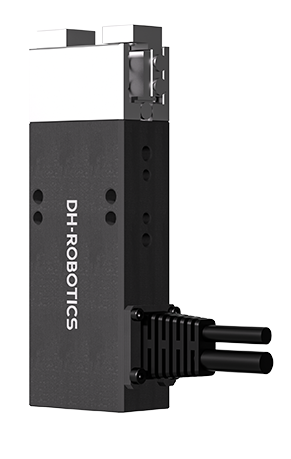
The PGEA series is a slim-type electric micro gripper, a comprehensive upgrade from our hot-selling PGE series. Compared to the previous generation, it offers more affordable pricing and shorter lead times (as fast as 10 days). Additionally, we have simplified the selection with two controller options: the external controller and the integrated controller. This small electric gripper maintains precise force control and fast response. Meanwhile, it features adjustable cable direction and added brake functionality, delivering a more reliable performance and higher production efficiency.
- Overview
- Applications
Product Features

Compact Size & Flexible Installation
With a compact structure, the small electric gripper features the thinnest size of 18mm, making it perfect to work in a tight space. Additionally, it supports at least five flexible installation methods to meet the demanding needs of clamping tasks.

High Working Speed
Our electric micro gripper achieves an impressive opening and closing time of 0.2 seconds, ensuring rapid and precise clamping to meet the high-speed demands of modern production lines. This device balances speed and stability, offering reliable performance in automation applications.

Precise Force Control
Powered by our advanced driver design and driving algorithm compensation, our small electric gripper enables continuous and precise force adjustments to accommodate various industrial requirements. With a force repeatability of 0.1N, our device ensures consistent and reliable performance, perfect for handling delicate and high-precision tasks.
Product Features
- Integrated design
- Interchangeable direct-output cable design
- Drop detection
- Adjustable parameters
- Intelligent feedback
- Replaceab
- IP40
- -30℃ low temperature operation
- CE certification
- FCC certification
- RoHs certification
Product Parameters
| PGEA-2-10 | PGEA-15-10 | PGEA-15-26 | PGEA-50-26 | PGEA-100-26 | PGEA-15-40 | PGEA-50-40 | PGEA-100-40 | |
|---|---|---|---|---|---|---|---|---|
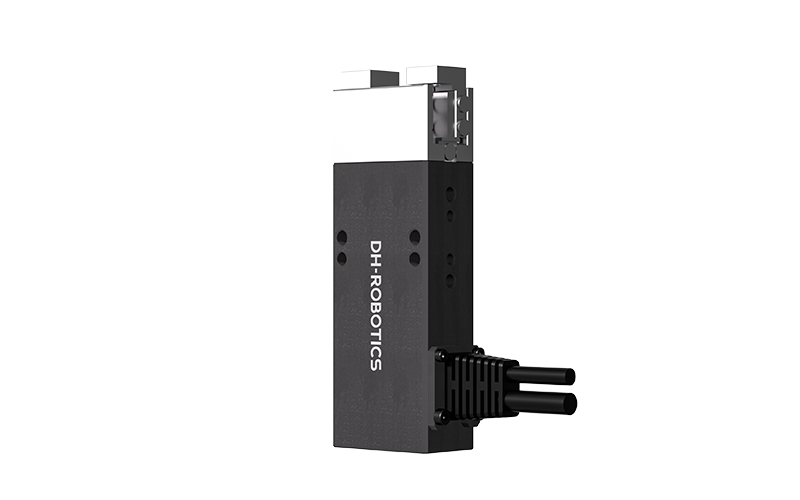 |
 |
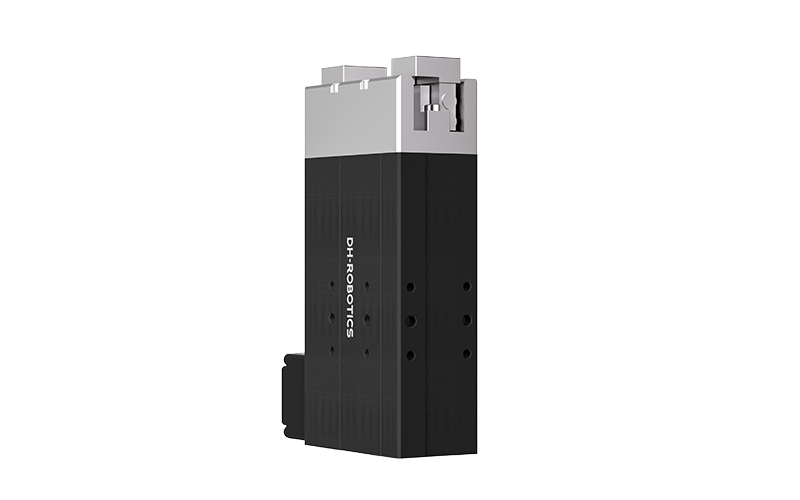 |
 |
 |
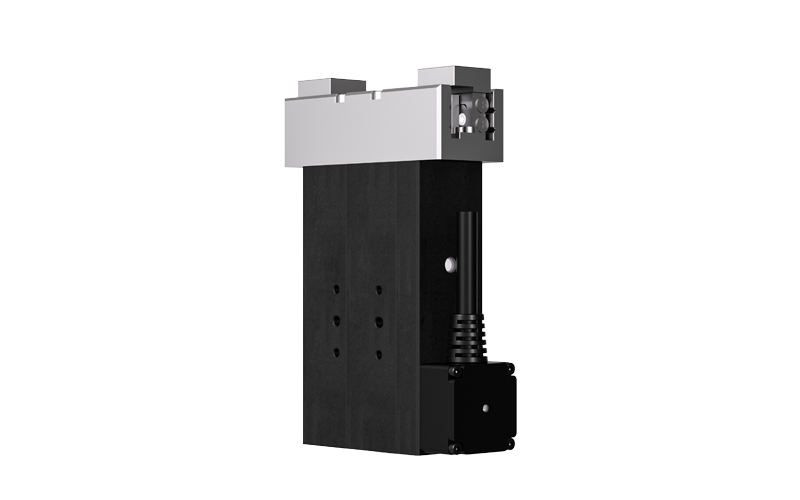 |
 |
 |
|
| Gripping force (per jaw) | 0.8 – 2 N | 6 – 15 N | 6 – 15 N | 15 – 50 N | 30 – 100 N | 6 – 15N | 15 – 50 N | 30 – 100 N |
| Stroke | 10 mm | 10 mm | 26 mm | 26 mm | 26 mm | 40 mm | 40 mm | 40 mm |
| Recommended workpiece weight | 0.05 kg | 0.1 kg | 0.25 kg | 1 kg | 2 kg | 0.25 kg | 1 kg | 2 kg |
| Repeat Accuracy(positioning) | ± 0.02 mm | ± 0.02 mm | ± 0.02 mm | ± 0.02 mm | ± 0.02 mm | ± 0.02 mm | ± 0.02 mm | ± 0.02 mm |
| Weight | 0.15 kg | 0.15 kg | 0.5 kg with or without brake | 0.5 kg with or without brake | 0.53 kg/0.6 kg with brake | 0.6 kg with or without brake | 0.6 kg with or without brake | 0.6 kg with or without brake |
| Noise emission | < 50 dB | |||||||
| Driving method | Rack and Pinion Crossed Roller Guide | |||||||
| Communication interface | Standard: Modbus RTU (RS485)、 Digital l/O (2 inputs 2 outputs) Optional: TCP/IP、 USB2.0、 CAN2.0A、 PROFINET、 EtherCAT | |||||||
| Nominal Voltage | 24 V DC ± 10% | |||||||
| Nominal & Max. current | 0.1A(Rated) 0.2A(Peak) | 0.2A(Rated) 0.3A(Peak) | 0.3A(Rated) 0.8A(Peak) | 0.2A(Rated) 0.8A(Peak) | 0.3 A (Rated) 1.2 A (Peak) | 0.3 A (Rated) 0.8 A (Peak) | 0.2 A (Rated) 0.8 A (Peak) | 0.3 A (Rated) 1.2 A (Peak) |
| Max power | 5W | 8W | 20W | 20W | 30W | 20W | 20W | 30W |
| IP protection class | IP 40 | |||||||
| Recommended operating environment | 0~40°C,under 85% RH | |||||||
| Overseas standards | CE,FCC,RoHS | |||||||
Applications
Reagent card positioning, grabbing and testing
The PGE series of industrial slim-type parallel electric gripper was applied with automation modules to complete the repeated positioning, grasping and testing of reagent cards.
Handling and positioning of small workpieces
The PGE series industrial slim-type parallel electric gripper was applied to complete the handling, positioning and precision assembly of extremely small work-pieces.
IGBT module detection loading and unloading
The application of automatic loading and unloading with electric gripper is from IGBT module (for new energy vehicles) of testing equipment in the semiconductor industry. With sensors and SCARA robots, dual-grippers for simultaneous is loading and unloading of IGBT modules, equipment could frequently change materials. The PGE-50-26 and PGI-140-80 with large stroke, high clamping force electric jaws, are compatible with materials of different sizes.
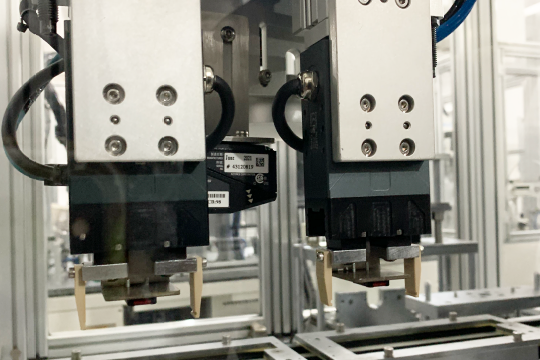
Mobile phone detection loading and unloading
In Mobile phone audio detection process section, robot equipped with grippers is picking and placing the mobile phones. The PGE series of industrial thin parallel electric gripper can quickly complete the equipment deployment of product changeovers. The electric gripper have large strokes and strong compatibility. They can hold mobile phones of different sizes. With integrated design and precise force control, the grippers could complete the task without any external sensor.
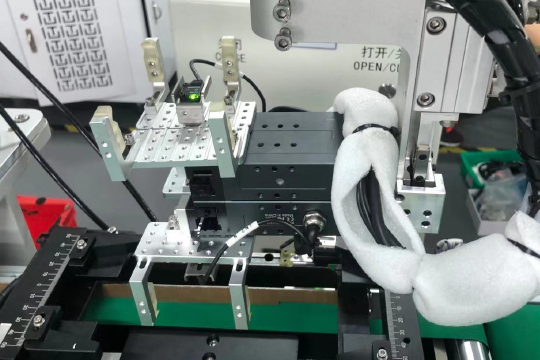
Grab the headset to wipe the glue
After the wireless Bluetooth headset is assembled, the shell package will overflow glue, and the overflow glue will be erased by using the collaborative robot + six-dimensional force sensor.
The gripping force of the pneumatic gripper is unstable, which is easy to cause damage to the surface of the earphone. Therefore, our electric gripper with accurate force control is selected for earphone clamping.
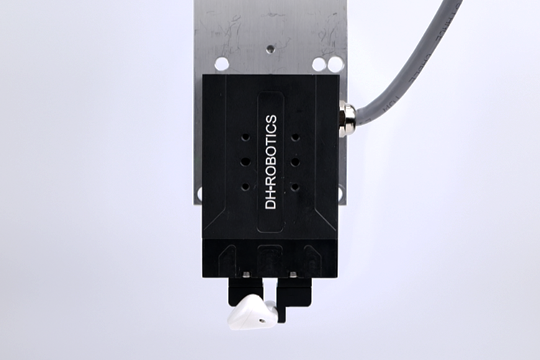
VR glasses lens inspection
In this application, the lens was gripped for surface inspection and to scan the QR code. Compared to the suction cup solution with pneumatic gripper for picking&placing which is easy to cause the damage on the lens, our PGE-5-26 electric gripper with precise force control will protect the lens and also able to grip lens with different size.
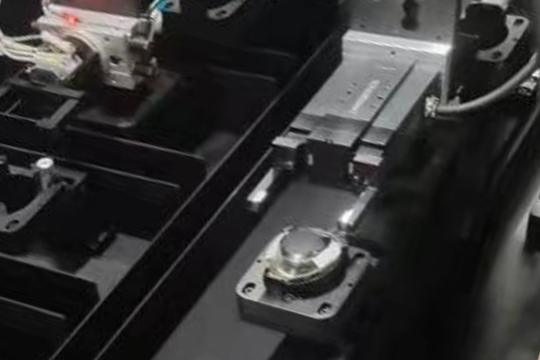
Chips Pick & Place
For chip handling on wafer sorters in the semiconductor industry, vacuum suction cups are traditionally used to pick &place chips. Due to insufficient vacuum of the suction cups, there is a risk of falling during handling, so the electric gripper of PGE-2-12 is applied in this application.
Advantages of the PGE series: It can achieve precise force control, high repeat position accuracy, and non-destructive grabbing of chips.
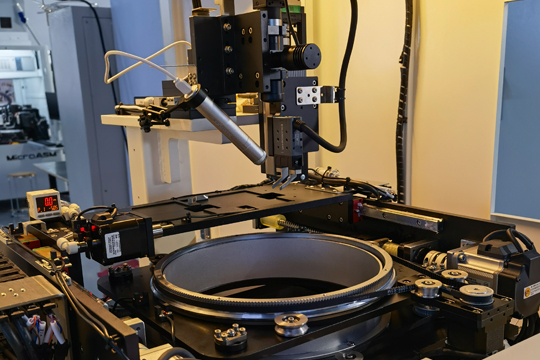
96-well plate storage and handling
The unmanned laboratory is not only embodied in the sample preparation link. Through the combination of “AGV + Six-axis Robot + Electric Gripper + 3D vision”, the 96-well plate reagent kit handling task after the sample is divided into cups can also be unmanned. DH-Robotics electric grippers can complete the task of picking and unloading materials, transfer the 96-well plate to the storage bin, or transport the processed sample box to the testing equipment to stabilize the grip and ensure the safety of the sample during transportation.
Unmanned new Coronavirus detection
More possibilities for unmanned Coronavirus detection and throat swab sampling: The solution is AGV with two RGI rotating grippers and one PGE parallel electric gripper to complete the collection of collectors, sampling, test tube opening, storing samples, and closing lids , Disinfection and all the above processes. No human intervention is required during the whole process.
Throat swab sampling robot
At present, various emergencies have higher requirements for nucleic acid testing organizations. Chinese Government recently notified the requirement to “ensure that all inspections should be completed within 2 days if the number of inspectors is less than 5 million, and all inspections should be completed within 3 days if the number of inspections is greater than 5 million.” This is undoubtedly a huge challenge in terms of speed and safety.
The throat swab sampling robot with DH-Robotics PGE series gripper can complete the sampling step independently without medical staff, and the results can be obtained in as fast as 45 minutes. According to the feedback from the subjects, the robot moves gently and has a good experience. It can be used as an aid to manual detection, improving detection efficiency and saving manpower.
Nucleic Acid Virus Cupping Apparatus
The sub-cup process transplants the scattered reagents into the reagent kits for batch processing and testing (24, 48, 96-well plates) which meet the international standards. In this process, the application of electric grippers can maintain the cleanliness of the kit and samples to the greatest extent.
The virus tube was gripped and rotated for scanning the sampling information.
Automated cup processing system
The automatic sub-cup processing system, through ABB’s Scara robotic arm and DH-Robotics electric gripper, can automatically complete the operation of sample tube opening, scanning, information entry, pipetting, turning plate, and closing lid. The whole process is in a closed negative pressure state to ensure that the sample is clean and free from contamination.
